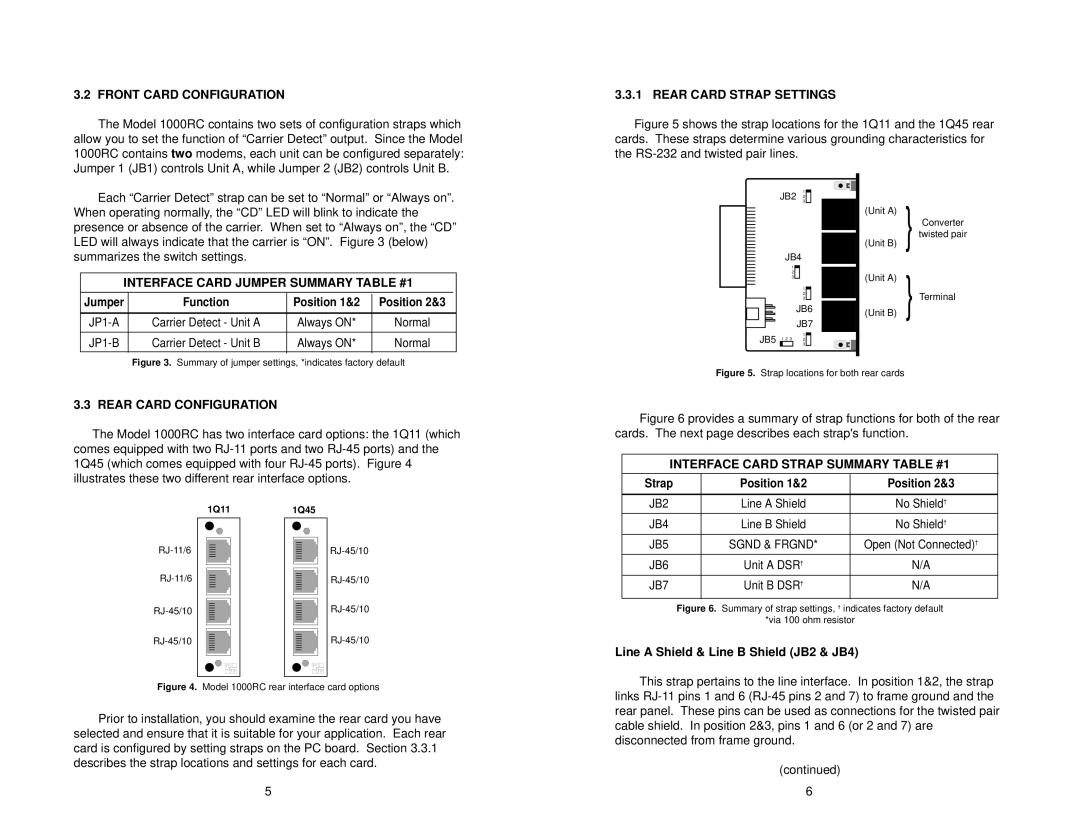
3.2 FRONT CARD CONFIGURATION
The Model 1000RC contains two sets of configuration straps which allow you to set the function of “Carrier Detect” output. Since the Model 1000RC contains two modems, each unit can be configured separately: Jumper 1 (JB1) controls Unit A, while Jumper 2 (JB2) controls Unit B.
3.3.1 REAR CARD STRAP SETTINGS
Figure 5 shows the strap locations for the 1Q11 and the 1Q45 rear cards. These straps determine various grounding characteristics for the RS-232 and twisted pair lines.
Each “Carrier Detect” strap can be set to “Normal” or “Always on”. When operating normally, the “CD” LED will blink to indicate the presence or absence of the carrier. When set to “Always on”, the “CD” LED will always indicate that the carrier is “ON”. Figure 3 (below) summarizes the switch settings.
INTERFACE CARD JUMPER SUMMARY TABLE #1
Jumper | Function | Position 1&2 | Position 2&3 |
|
|
|
|
|
|
Carrier Detect - Unit A | Always ON* | Normal | ||
|
|
|
|
|
Carrier Detect - Unit B | Always ON* | Normal | ||
|
|
|
|
|
Figure 3. Summary of jumper settings, *indicates factory default
|
|
|
|
|
|
|
| JB2 |
| 1 | |||
|
|
|
|
|
|
|
|
| 2 | ||||
|
|
|
|
|
|
|
|
|
|
|
| 3 | |
|
|
|
|
|
|
|
|
|
|
|
| ||
|
|
|
|
|
|
|
|
| JB4 |
| |||
|
|
|
|
|
|
|
|
|
|
|
|
|
|
|
| 1 |
|
|
|
| |||||||
|
|
|
|
|
| ||||||||
|
| 2 |
| 1 | |||||||||
|
| 3 |
| ||||||||||
|
|
| |||||||||||
|
|
|
|
|
|
|
|
|
|
| |||
|
|
|
|
|
|
|
|
|
|
| |||
|
|
|
|
|
|
|
|
|
|
| |||
|
|
|
|
|
|
|
|
|
|
| 2 | ||
|
|
|
|
|
|
|
|
|
|
| 3 | ||
|
|
|
|
|
|
|
|
|
|
| JB6 | ||
|
|
|
|
|
|
|
|
|
|
| |||
|
|
|
|
|
|
|
|
|
|
|
|
|
|
|
|
|
|
|
|
|
|
|
|
|
|
|
|
|
|
|
|
|
|
|
|
|
|
|
|
|
|
|
|
|
|
|
|
|
|
|
|
| JB7 | ||
|
|
|
|
|
|
|
|
|
|
|
| ||
|
|
|
|
|
|
|
|
|
|
| 1 | ||
|
|
| JB5 | 1 2 3 | |||||||||
|
|
| 2 | ||||||||||
|
|
|
|
|
|
|
|
|
|
| 3 | ||
(Unit A)
(Unit B)
(Unit A)
(Unit B)
}
}
Converter
twisted pair
Terminal
3.3 REAR CARD CONFIGURATION
The Model 1000RC has two interface card options: the 1Q11 (which comes equipped with two
1Q11 | 1Q45 |
Figure 4. Model 1000RC rear interface card options
Prior to installation, you should examine the rear card you have selected and ensure that it is suitable for your application. Each rear card is configured by setting straps on the PC board. Section 3.3.1 describes the strap locations and settings for each card.
5
Figure 5. Strap locations for both rear cards
Figure 6 provides a summary of strap functions for both of the rear cards. The next page describes each strap's function.
INTERFACE CARD STRAP SUMMARY TABLE #1
Strap | Position 1&2 | Position 2&3 |
|
|
|
JB2 | Line A Shield | No Shield† |
|
|
|
JB4 | Line B Shield | No Shield† |
|
|
|
JB5 | SGND & FRGND* | Open (Not Connected)† |
|
|
|
JB6 | Unit A DSR† | N/A |
|
|
|
JB7 | Unit B DSR† | N/A |
|
|
|
Figure 6. Summary of strap settings, † indicates factory default
*via 100 ohm resistor
Line A Shield & Line B Shield (JB2 & JB4)
This strap pertains to the line interface. In position 1&2, the strap links
(continued)
6
